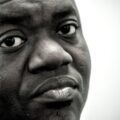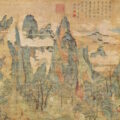Beyond Shakespeare: Thinking globally on the anniversary of the playwright’s death

Which authors do students entering college in the United States need to be familiar with? Homer? Dante? Austen? Dickinson? Ellison? All of the above? No. According to the Common Core State Standards Initiative, adopted by forty-two states, students need to know only one named author: William Shakespeare.
If you can only know one author, Shakespeare is an excellent choice. But there is a downside to our fixation on this one great writer: it blinds us to the wider world of his time—and ours. This April 23 marked the 400th anniversary of Shakespeare’s death, and there were many celebrations and remembrances in his honor (including one at Rhodes College in Memphis for which I gave a keynote).
If you studied Shakespeare in high school or college, you were probably presented his work in the context of the English literary tradition. That has been a focus of scholarship for hundreds of years, and Shakespeare scholars—every English department needs one—have brought wonderful illumination to his sonnets and plays. For the most part, however, they have not connected him to the wider world. Though England was still a bit player on the global stage during Shakespeare’s lifetime—the world’s greatest power was China, followed by the three great Muslim empires, Ottomans, Safavid Persians, and the Mughals in north India—the English were keenly aware of world developments and the fact that they were inhabiting a newly global world.
1616 marked not only the death of Shakespeare but also of other great writers, among them Miguel de Cervantes, who (as Juan Goytisoslo has observed) caused Spain to view itself from the perspective of Muslim north Africa (where he had been held as a slave for five years); the Latin American writer Garcilaso de la Vega “The Inca,” an author of mixed Spanish and Andean descent, who helped conceptualize the European role in the Americas (another Andean author, Guaman Poma, published the most extensive critique of Spanish colonial rule this same year); and the Chinese writer Tang Xianzu, author of The Peony Pavilion, who is as important a playwright in the Chinese tradition as Shakespeare is for the English. Our enthusiasm for Shakespeare should not lead us to overlook their contributions and those of other authors and other cultures around the world.
That is especially true in our hyper-globalized age. Ignorance of other cultures and their histories does not serve us well at a time when a visit to China can be made over a weekend. This process of globalization began during the age of Shakespeare—and it underlies much of his achievement.
In 1599, Shakespeare’s company The Chamberlain’s Men was forced to open a new theater after a dispute with their landlord prevented them from continuing at the former venue, called simply The Theatre. The group was facing a financial crisis. Their aged impresario, before his recent death, had invested aggressively in an upscale venue called Blackfriars, but the venture was thwarted by NIMBY protests, nearly wiping out the group’s finances. What’s more, The Theatre had launched a craze for performances. Playhouses proliferated under Elizabeth’s reign beyond all precedent.
The company was forced to rebrand. The name they chose for their venue was The Globe. Shakespeare built upon the new name in a comedy likely written in 1599, when the theater opened to the public. As You Like It, the title promised. The play alludes to “the wide and universal theatre,” a phrase the company must have hoped would describe their new theater. “All the world’s a stage,” the play advised, “and all the men and women merely players.”
Why was “The Globe” a good brand for the struggling company? During Shakespeare’s lifetime an Englishman, Sir Francis Drake, circumnavigated the world. A group of investors calling themselves the Virginia Company established the first successful English colony in North America at Jamestown. Stories of the shipwreck of The Sea Venture, a vessel carrying John Rolfe—the future husband of Pocahontas—to Jamestown appear to have informed Shakespeare’s play The Tempest. Pocahontas herself visited London in the year of Shakespeare’s death, the same year a Dutch sea captain discovered a sea route around Cape Horn, provided better access between the Atlantic and Pacific.
Thomas Roe established England’s first embassy to the Mughal court in India, and another Englishman, Robert Sherley, became an ambassador representing the Safavid court of Persia. English sailors were even venturing into East Asian waters, where the Portuguese and Spanish were well established.
Regular trade connected the Americas to both Asia and Europe (and Africa: in 1616 the first African slave was brought to Bermuda). The first world map produced in China to show the Americas was created by a missionary from the West, Matteo Ricci, working with Chinese colleagues, and the team of Jesuits and Chinese literati followed that up with a majestic globe (now lost).
All of this, and more, happened in Shakespeare’s life. For the first time, the world was truly global, and it was coming to the bard.
One way we know for sure?
Pipes.
Analysis in 2002 of early seventeenth-century smoking pipes from Stratford—including some discovered in in Shakespeare’s own garden—underscores the global character of his world. The analysis employed “state-of-the-art forensic technology at the South African Police narcotics laboratory” (one of the authors of the report was a police inspector) and the results revealed the presence of cocaine (presumably from smoking coca leaves) and strongly suggested the presence of cannabis.
The lead researcher, Francis Thackeray, has pointed to phrases in Shakespeare’s sonnets such as “a journey in my head” (Sonnet 27), “invention in a noted weed” (Sonnet 76), and “compounds strange” (Sonnet 76) to suggest that the bard was a secret stoner. “The notorious association between narcotics and creativity has been assumed to be a post-Romantic phenomenon in European culture, but our research gives reason to question this assumption,” the researchers soberly conclude. In my opinion, all of these quotes are taken out of context. Shakespeare never refers to smoking of any kind, and I doubt that he had much experience with any such drugs.
Coverage of this research has exclusively focused on the presence of the high-profile psychoactive drugs. I would like to point out something different: the extent to which substances found in the pipes reflect the globalization of Shakespeare’s world. Cannabis likely came via West Asia or North Africa, through contact with the Ottoman empire. Or it could have come from South Asia. Coca must have come from the Andes, either (as the researchers suggest) brought to England by Sir Francis Drake or (perhaps just as likely) carried by undercover Catholic priests via Spain. Moreover, discussion of the analysis of the pipes has overlooked the discovery of several less sensational substances.
Nicotiana, as would be expected, was indeed found. Tobacco was brought to England from the Americas by Drake and others. Myristic acid was found as well, likely from nutmeg, a prized (and expensive) herb brought from the East Indies. Cinnamaldehyde probably came from Cassia fistula (“the Golden Shower Tree”) from sources in India. Camphor was brought from Borneo (it might have been used to conceal the smell of the smoke, or to flavor it). Quinoline and butylquinone probably came from the South American cinchona plant, the source of the medicine quinine and the bittering agent in some cocktail bitters.
A similar range of spices and other ingredients from around the world appears in cookbooks from the period, as Wendy Wall has shown in her Recipes for Thought: Knowledge and Taste in the Early Modern English Kitchen. It was an age of experimentation, when new products from distant places were being regularly tested. The whole world, it seems, was connected to Shakespeare’s own garden.
That influence has gone the other way too, of course. That Shakespeare’s works have themselves been adopted globally is well known. A smuggled copy of his writings, for instance, inspired Nelson Mandela during his years of solitary confinement. In Latin America, a long argument extending from the Uruguayan writer José Enrique Rodó (1871–1917) and the Nicaraguan Rubén Darío (1867–1916) through the Cuban Fernández Retamar (b. 1930) has focused on whether the Americas are best compared to Caliban or Ariel from The Tempest, while Negritude writers from the Caribbean and Africa have focused on the same play as a commentary on colonialism (provoking Harold Bloom, who has railed against Caliban being presented as “an Afro-Caribbean heroic Freedom Fighter”). This year the Globe Theatre Company returns home to England after having presented Shakespeare in 197 countries over the past two years. They performed on a tennis court in Kabul, Afghanistan, the Zaatari Refugee Camp near Syria in Jordan, the Jungle Refugee Camp in Calais.
America, of all nations, should be sensitive to the contributions of other cultures—“to bring, perhaps from afar, what is already founded,” as Walt Whitman wrote in a poem composed for the fortieth National Industrial Exposition of the American Institute in 1871. The United States today is more diverse than it has ever been. Understanding the country, and the myriad traditions that now constitute it, will require discussions of the world whole. It’s not enough to focus on one writer in isolation, however exceptional or influential. Indeed, Shakespeare becomes even more meaningful when his writing is connected to that of other traditions, such as developments in the Americas that influenced The Tempest or the world of Islam that colors Othello’s speeches. As we celebrate Shakespeare, we should also acknowledge the global world that informed his work, and the inspiring contributions of all cultures.
About Tom Christensen
Thomas Christensen’s books include 1616: The World in Motion; River of Ink: Literature, History, Art; The U.S.–Mexican War; New World/New Words: Recent Writing from the Americas; and translations of works by such authors as Carlos Fuentes, Julio Cortázar, Laura Esquivel, Louis-Ferdinand Céline, and José Ángel Valente. Find him at his website, rightreading.com.





